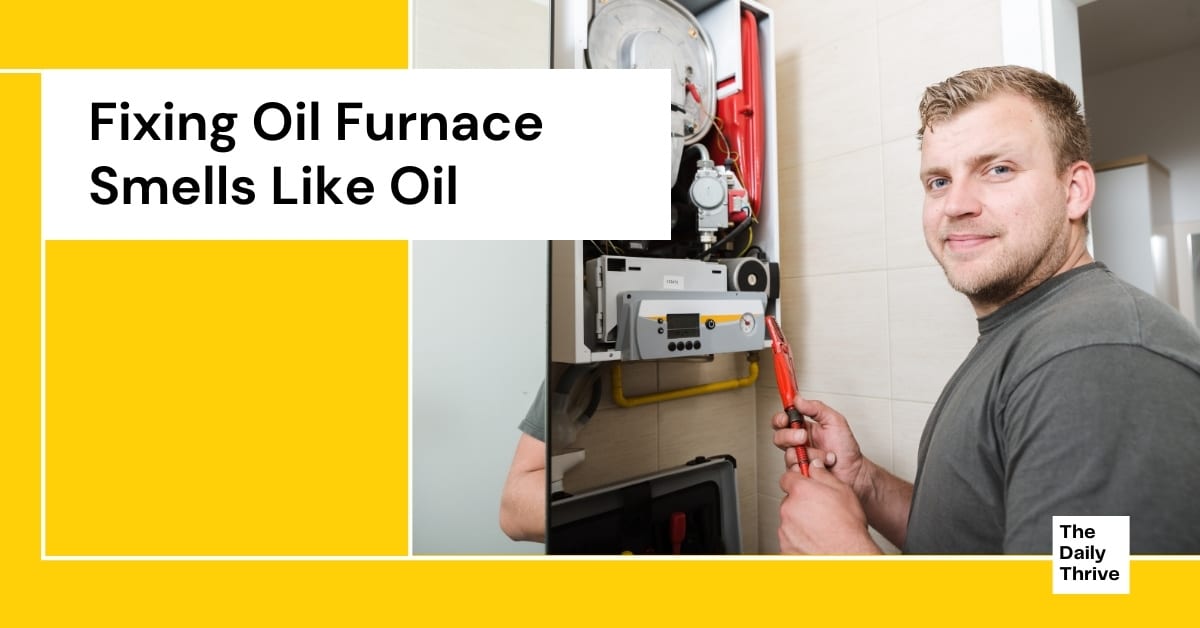If you have an oil furnace, you’re probably aware that an oil leak can cause a serious problem. Before attempting any repair, look for signs of a leak. When you spot a leak, contact a professional to assess and fix the problem immediately. However, if you don’t see a leak, but the oil furnace smells like oil, there may be a simple fix.
Of course, if you are uncomfortable working on your furnace, you’ll probably want to contact a professional to fix any furnace problems. If you don’t have someone you can call, consider using our Free HVAC Quotes application: they can often suggest a competent technician in your area.
Troubleshooting An Oil Furnace Smells Like Oil
Step #1
Make sure that the heating oil tank is filled to at least 30 percent capacity. If it is lower than that, the low capacity could have allowed air to enter your furnace and, consequently, the entire system. If this is the case, plan on scheduling a fill and checking to make sure that there is no damage to your furnace. The oil smell should dissipate once the tank is filled.
Step #2
The second possible problem is a worn nozzle in the burner of the furnace. A nozzle that needs to be replaced can cause a very small leak but a very large smell.
Step #3
Clean the nozzle on the oil furnace. If that doesn’t take care of the problem, note the model number of the nozzle and order a replacement part. Install the new nozzle immediately to eliminate the oil smell.
Step #4
Finally, an oil furnace that smells like oil could indicate a dirty oil filter. Use your owner’s manual for information on cleaning and replacing your oil filter. In most cases, the filter for your furnace can be cleaned and does not have to be replaced.
Oil Furnace Care and Maintenance
Start by considering your furnace filters – do they need changing or replacing?
Furnace filters catch all the dust and debris that run through your ducts and help to purify the heat that comes out of your vents. When the filter gets clogged, your furnace works hard and exerts more energy than necessary. In extreme cases, the blower may be affected, triggering the need for costly repairs. Replace your disposable filters as the first part of oil furnace maintenance.
Schedule a tune-up yearly by a licensed HVAC repair specialist to keep your oil furnace in good running order.
It’s a good idea to schedule this in early fall before you have to turn on your furnace to give you time to schedule any furnace repairs that need to be done. A technician will check your flues, ducts and temperature settings, examine your heat exchanger for cracks or other damage, and double-check all safety mechanisms to ensure proper furnace efficiency.
HVAC maintenance should take place regularly if you want to avoid emergency furnace repairs.
Some HVAC technicians will offer furnace maintenance packages. It may be a good idea to look into these if you don’t feel up to maintaining your furnace yourself. If you are a do-it-yourselfer, you can keep your furnace running efficiently by checking your owner’s manual regularly.
Tasks you can do yourself include checking to see if the blower motor needs to be lubricated, replacing frayed belts, checking for visible cracks or blockages, and more.
Proper furnace maintenance allows you to keep your furnace running longer and put off any expensive repairs. Always make sure to check your furnace annually to avoid an oil furnace smells like oil problems mentioned above and keep your equipment in good running order.
If you can’t find the source of the oil furnace smells like an oil problem, be sure to call a professional to locate the problem and fix it.






